Compass-Finding-Our-Voice-Final1
Compass-Finding-Our-Voice-Final1
Compass-Finding-Our-Voice-Final1
Create successful ePaper yourself
Turn your PDF publications into a flip-book with our unique Google optimized e-Paper software.
<strong>Finding</strong> <strong>Our</strong> <strong>Voice</strong> - Making the 21st Century State<br />
6 The limits of the bureaucratic state<br />
Jeremy Gilbert and Zoe Williams<br />
Here is the deepest difficulty in the whole development of our democracy: that we seem reduced to a choice<br />
between speculator and bureaucrat, and while we do not like the speculator, the bureaucrat is not exactly<br />
inviting either. In such a situation, energy is sapped, hope weakens, and of course the present compromise<br />
between the speculators and the bureaucrats remains unchallenged.1 Raymond Williams<br />
By the early 1960s it was already commonplace to observe that both state and corporate institutions were<br />
becoming increasingly bureaucratic, in both the capitalist and the socialist worlds. To many casual and<br />
professional observers this seemed to bear out the assumptions of social theorists such as Max Weber, who<br />
had believed that the growing reach and power of bureaucracy was simply the inevitable destiny of modern<br />
societies. From the project for workers’ self-management in Yugoslavia, to the social and cultural movements of<br />
the 1960s and 1970s, to the upsurge of shopfloor militancy during the same period, to the New Right’s assault<br />
on big government, radicals of many stripes set their faces against this stifling tendency of modern culture.<br />
Here is something to reflect on. In the middle decades of the 20th century, dystopian visions of the future always<br />
revolved around the threat of an all-encompassing state, administering, observing and regimenting every aspect<br />
of human existence. Think Metropolis, 1984, A Clockwork Orange. But by 1980 this had changed. From Blade<br />
Runner to Mad Max to the pages of 2000 AD, the future we were afraid of became not one in which the state<br />
had become too powerful, but one in which it had disappeared altogether. In their different ways, all of these<br />
fictions depicted a lawless world in which order is only maintained by way of arbitrary brutality, while civilisation<br />
has either broken down completely or been entirely colonised by commercial corporations.<br />
But this is not exactly what happened either. We live in an era now when the function of bureaucracy has<br />
certainly changed, but it has neither disappeared nor invaded every aspect of life. Instead, it seems that<br />
bureaucracy today has a very specific set of functions, which all amount to ensuring that we behave within a<br />
specific set of parameters, which nonetheless allow for a great deal more personal freedom in certain regards<br />
than did the arrangements typical of prior epochs.<br />
Consider, for example, the effect of bureaucratic institutions and their expectations on a secondary-school<br />
teacher. Within living memory, a teacher who was publicly identified as gay could be sacked and even<br />
imprisoned for it. Today, the state is more likely to intervene to protect them from homophobic bullying than to<br />
practice it. It is debatable whether a classroom teacher today has more or less latitude when it comes to<br />
determining the content of their teaching than they would have done 50 years ago. But what is clear is that no<br />
matter what that content may consist of, they will be closely monitored according to an arbitrary set of arithmetic<br />
performance indicators in ways which would have been unimaginable in a previous epoch.<br />
This type of monitoring has a sort of double-effect. It encourages certain kinds of innovation, originality and<br />
creativity on the part of workers in many different spheres, including their ‘private’ lives, but it also constantly<br />
frustrates that creativity by policing it according to a set of arbitrary, normative, competitive criteria. It offers a<br />
version of the freedom which the radicals of the 1960s longed for, but a version of it which ultimately – to use<br />
Raymond Williams’ terms – uses the bureaucrats to subject all of the activities of those workers to a set of<br />
criteria, which are actually determined by the speculators. Because ultimately, in the public and private sectors<br />
today the bottom line is the bottom line. If an idea, skill or piece of knowledge is not marketable, then it is<br />
worthless. And bureaucracy has taken upon itself the job of determining such worth in situations, such as<br />
classrooms, where the market really cannot. People hate this. Which is one reason why the left should not be<br />
afraid to attack it.<br />
The significant success of the right was to create a plausible enemy out of ‘big government’, and thereby make<br />
the shrinking of the state an end in itself. It did this by portraying overweening bureaucratic structures as the<br />
natural endpoint of the state, a faceless, unresponsive apparatus, strictly imposing elaborately pointless<br />
requirements.<br />
| Page 19


